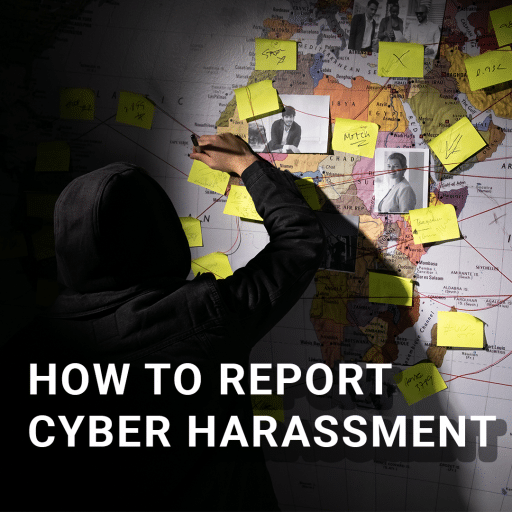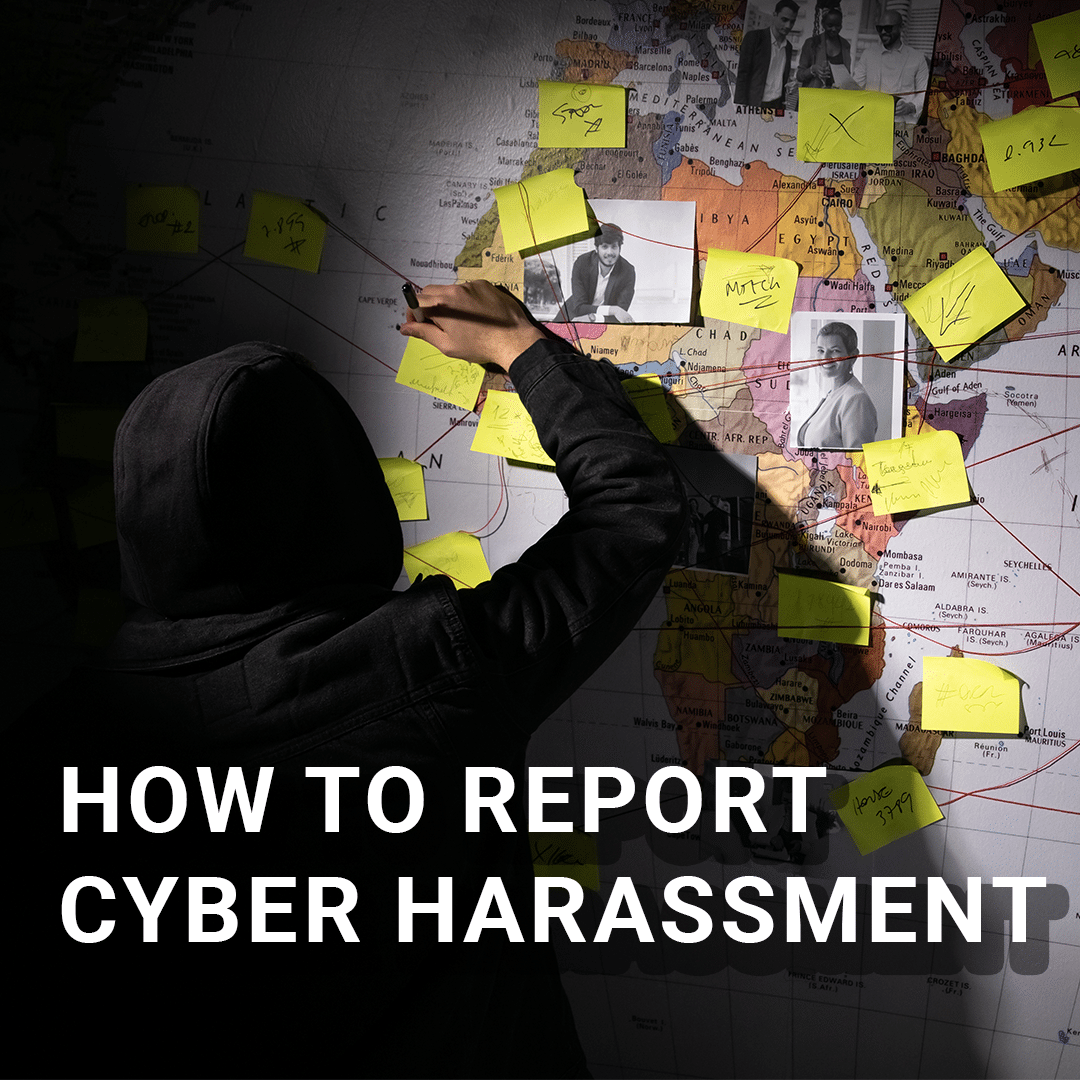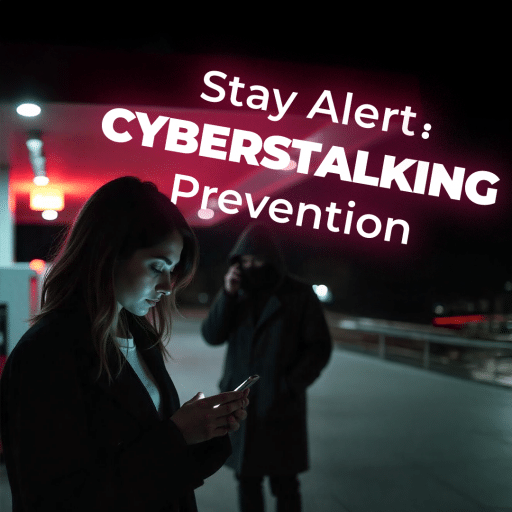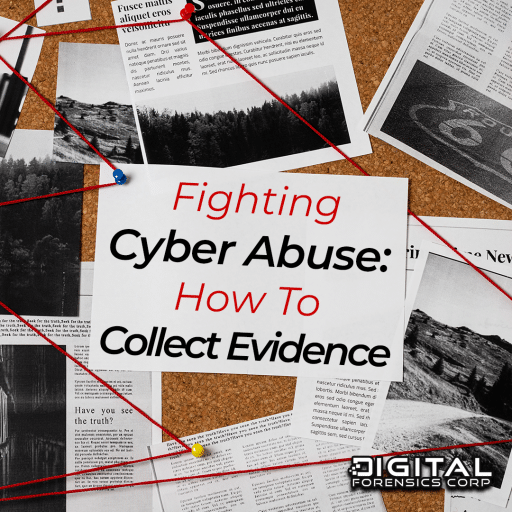Cyber harassment is one of the most distressing experiences someone can face. This intrusive abuse often leaves victims feeling vulnerable and helpless. While internet anonymity may embolden criminals to carry out such illegal acts, it doesn’t make them untouchable. There are concrete steps you can take to protect yourself, seek justice, and reclaim your peace of mind.
Who Can you Report Cyber Harassment To?
If you’re a target of cyberbullying, cyberstalking, doxxing, or trolling there are different ways to report it. You may choose to pursue different options based on your unique situation, the type of harassment, and its intensity.
- Social Media Administrators: The majority of social media sites include tools that let their users report offensive material and conduct to their system administrators. If any account is found guilty of violating their terms, the account will likely be removed and deleted. In case you wish to use that information for an investigation or legal claim, make sure you are not blocking the user and document everything that occurred through screen shots.
- Police: Depending on your location, your local police department may have special divisions equipped to handle cybercrimes. They may also direct your to national organizations like the FBI. If you report the cyber harassment to the FBI, you’ll need to do so through their IC3 (Internet Crime Complaint Center).(1)
- Cyber Security Company: There are many private cyber security companies that work to identify cybercriminals. This is a resource you should consider if you are unable to verify the real identity of your cyber harasser or stalker.
What Types of Cyber Harassment Can I Report.
While there are many definitions of cyber harassment, this list provides a comprehensive overview based on federal U.S. laws and those of its 50 states. However, it’s essential to review your local laws to ensure you have accurate and up-to-date information on actions defined as cyber harassment in your local jurisdiction.
- Email Harassment: Violent, persistent, or dangerous unsolicited emails meant to cause fear or panic. Inform your email provider and local authorities about the harassment, especially if there are threats.
- Cyberbullying: Frequent, targeted abuse aimed at causing emotional suffering, often through messaging apps or social media. It could be from mockups, violent messages, persistent slurs or offensive posts or interactions. Important to take note that in cyberbullying, it needs to cross a boundary into threats, defamation, or serious emotional harm in order to be actionable in many jurisdictions.
- Sexual Harassment: An abuser sending unwelcome sexual content, messages, or comments. This type of harassment can be escalated to law enforcement. If the case involves the threat of sharing intimate images of you without your consent, it is classified either as revenge porn or sextortion and requires a different approach. If your case falls into sextortion please contact our Sextortion Helpline to discuss your case with one of our specialists.
- Cyberstalking: Relentless and aggressive online conduct, such sending too many messages, monitoring of your actions, or trespassing into your digital accounts. It often involves attempts at control or intimidate.
Will my harasser know I reported them.
Individuals are not automatically notified of the initiation of an investigation by law enforcement. In circumstances where a crime has been committed, officials typically initiate contact with the reported individual to ask about pertinent information. However, the decision to investigate is at the discretion of police department or federal authorities. Investigations are not conducted on every report received, and the frequency of investigations is subject to various factors, including the country of origin and the volume of reports received.
It’s understandable if you feel scared when considering reporting harassment, but it is important to recognize that speaking is the only way to help ensure your safety. If you want to guarantee total anonymity and reporting in a discrete way, the best course of action is to get in touch with a cybersecurity company.
Who Investigates Cyber Harassment.
In order to put an end to the harassment and protect yourself, different organizations and experts could help you in the process. Depending on key factors and degree of the harassment, there are two options:
- FBI: Serves as the lead federal agency for citizens of the United States for all cybercrimes. The FBI launched their division IC3 (The Internet Crime Complaint Center) in 2000 to deal with issues including sextortion, internet fraud, extortion, blackmail, and cyber harassment
- Cyber Security Companies: They serve as private service for investigating and finding solutions for customer safety. Cybersecurity experts can help you analyzing and identifying the source of the harassment or abuse, gathering evidence for those who wish to file criminal or civil actions against their harassers.
Can You Get a Restraining Order for Online Harassment?
Yes, you can get a restraining order for online harassment if the behavior involves repeated threats, if someone’s stalking you, or if the criminal has performed an action that is deemed illegal by your state or federal government. To get one, it’s necessary to present evidence to the court, like messages, emails, or social media posts. Then, the court will decide if the scenario qualifies and assess the situation to determine the parameters of the individual restraining order.
How to Protect Yourself Online?
One of the most critical steps to protect yourself from cyber harassment is securing your personal data. Turn on 2-step verification, use password manager and back up your data. Limit the amount of personal information you share online, and keep your social media accounts private to avoid unknown profiles monitoring your activity.
Remember that to stop cyber harassment, you’ll need to report the issue. file the complaint, and seek help. Take quick and directed action ensures your safety and peace of mind.
Sources:
- Federal Bureau of Investigations IC3 Reporting: https://complaint.ic3.gov/
DISCLAIMER: THIS POST IS FOR INFORMATIONAL PURPOSES ONLY AND IS NOT TO BE CONSIDERED LEGAL ADVICE ON ANY SUBJECT MATTER. DIGITAL FORENSICS CORP. IS NOT A LAWFIRM AND DOES NOT PROVIDE LEGAL ADVICE OR SERVICES. By viewing posts, the reader understands there is no attorney-client relationship, the post should not be used as a substitute for legal advice from a licensed professional attorney, and readers are urged to consult their own legal counsel on any specific legal questions concerning a specific situation.







